In the middle of a small, gated desert town looms a large digital scoreboard. It doesn’t display sports scores, traffic delays, or safety alerts. Instead, the 20-foot-tall screen broadcasts something a bit more sinister–what each resident is worth–in actual currency. Each person is ranked, their name aligned with a hard, cold number.
This is not any small town. For one thing, the paved, tree-lined streets give way to a mishmash of design styles: an idyllic Craftsman-style house sits alongside a sleek hotel, while a Brooklyn brick bar corners a flashy Art Deco bank. If you’re hungry, a marble-floor restaurant with top celebrity chefs can satisfy your cravings, but so can a meal vending machine. Talking holograms routinely appear throughout many of the interior and exterior walls.
Welcome to 2025, the lavish dystopian reality-TV show that could be described as The Truman Show meets Black Mirror, but based on the principles of Monopoly. Or more aptly, a capitalist Hunger Games.
Here, 12 contestants enter an isolated Israeli town to compete in a societal experiment: What would happen if all of your day-to-day decisions were judged monetarily?
The newly minted residents are tethered to wristbands that both monitor their moves and display their financial balance. Meanwhile, everything costs money, including housing, food, beverages, clothing, even hot water. The scores change second to second depending on cash spent. It’s as much a reflection of human behavior as it is an exploration of modern society. What do people spend their money on? How does it affect their relationships? Will it impact their status?
Plenty of reality-TV shows have built impressive sets in the past, but 2025‘s might be one of the more ambitious. Produced by Israeli media group Keshet International, the production studio spent two years and roughly $15 million in development, building an entire fake (though fully functioning) town just south of Tel Aviv. The elaborate “set” includes hotels, a hostel, shops, eateries, pools, communal spaces, and a municipal building. They even built a picturesque fake mountain. The crew is made up of 300 people with 150 cameras at their command.
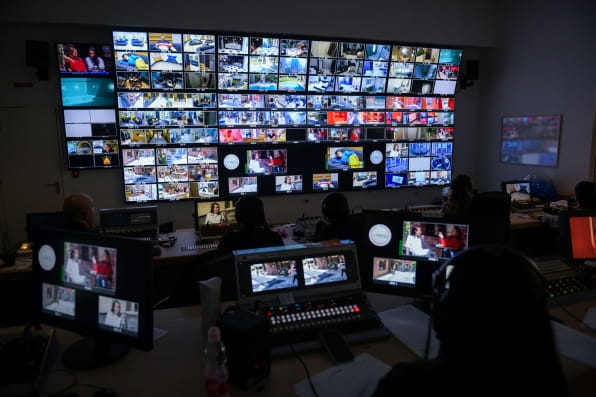
Up until a year ago, the property was a parking lot.
Throughout the show, the players continuously check armbands for their financial-saddled fates. Cameras capture every waking and sleeping moment and transmit their value to viewers in real time. In many ways, it feels like the realization of Gary Shteyngart’s dystopian novel, Super Sad Love Story, in which humans struggle amid a new information age where one’s financial and social ratings are displayed wherever they go.
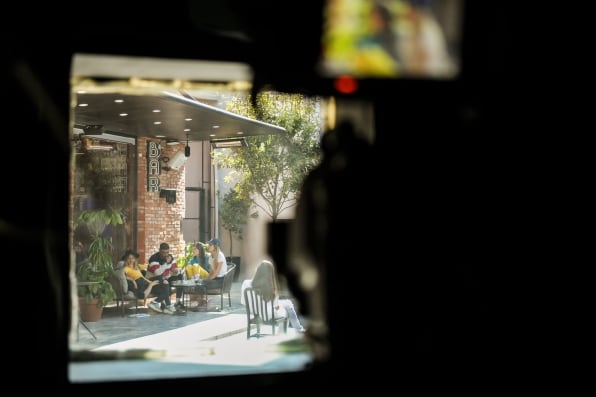
At one point during my set visit, a middle-aged man drags a chair just a few feet before the glaring scoreboard. He whips out his sunglasses, sets up shop, and simply watches the changing numbers and gliding names. Like an Instagram-addicted teen, he can’t tear himself away.
“At any given point, you know how much you’re worth,” Keshet Media Group CEO Avi Nir tells Fast Company. “This is part of the near future, where your status, your well-being, your whereabouts, are all totally transparent.”
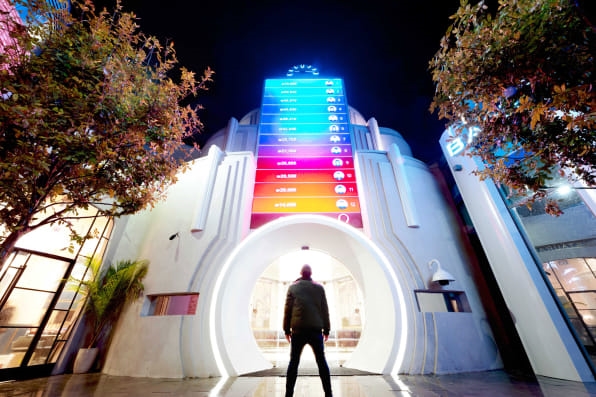
[Photo: courtesy of Keshet International]
The 2025 “city” is built around an inner parameter–a production studio that harbors one-way windows into all the buildings. While surveying the production area with a press group, I stop to observe a middle-aged woman blow-drying her hair. She’s completely ignorant that over a dozen people are monitoring her every stroke, just two feet away.
As she reaches for a deodorant, a producer notes that this specific contestant is famous: “That’s the Martha Stewart of Israel,” he whispers.
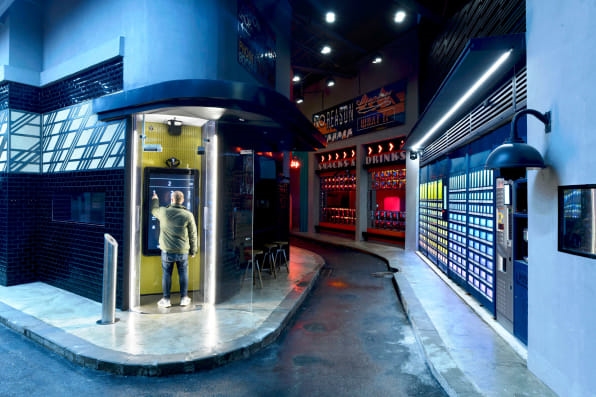
[Photo: courtesy of Keshet International]
How near are we to this future?
The game works like this: Upon entering the city, each contestant receives a smartwatch loaded with 12,000 Israeli shekels ($3,300) and stripped of their suitcase. Their confiscated belongings are available for purchase, even their own clothing and photos of their family.
Immediately, they must decide how and when to spend their money. They can opt for indulgent purchases, like a night in the hotel, but the smarter strategy is to use money to donate to friends, i.e., to buy alliances.
Viewers, meanwhile, can “vote” for their favorite player by donating to their accounts. At the end of every week, the contestant with the least amount of money is booted for someone new. And the winner? Whoever has the biggest bank account, of course.
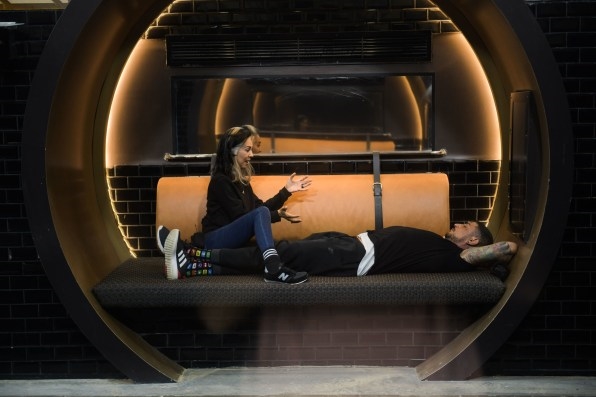
It all might sound a bit complicated and gimmicky (and at times, it is). But the show succeeds in demonstrating the social consequences of spending. For example, one player might help out a friend by buying him a nice meal, while another homesick contestant might purchase a photo of his kids. Do you buy a hot meal or spend money to call your mom? Or as many 2025 contestants did, spend it to check the internet (yep, that costs money too) when Luke Perry died?
Keshet worked with several economists during the development phase to best illustrate the idea of social currency. The team tested several models before deciding on behavioral economics, specifically tying it to a bank account.
“We could have left it abstract,” Nir says. “But it has to have real significance in the world.”
Viewers can take the monetary scoreboard literally, but producers hope that it symbolizes one’s “worth” by way of interpersonal relationships. You can be very generous, you can keep it all to yourself, or play it safe and give a little to everyone.

“We didn’t specifically use the word ‘money’ [on the show], because for us, it’s actually much more than that,” stresses Nir. “We want to be very explicit that this is about social networks.”
Contestants’ decisions receive real-time feedback. With every minute, they’re aware of how just the previous moment’s action translates to more (or less) capital.
One character by the name of Dudu donated 8,000 of his initial 12,000 shekels to a fellow player to ensure his spot. (In comparison, the average contestant donates less than a quarter of their available funds.) The single act of generosity catapulted Dudu to a viewer favorite, even safekeeping him in later rounds.
Character, thoughtfulness, and strong relationships are key to getting ahead in this game. “Unlike other shows, you don’t step on people,” says Revital Basel, managing director of networks, Keshet International. “You help them.” That, of course, doesn’t preclude the all-out fights: 2025, just like any other reality-TV game, features contestants in screaming matches and petty squabbles.

The difference with 2025 is the immediate transparency. How does what I do affect me right now? Will I change if I witness the consequences sooner than later? What if everything was laid bare? In many ways, society already mimics that immediate transaction: A wrong tweet can destroy a career, your social media followers can rise or fall in seconds.
2025 simply speeds it up for effect.
Nir explains that the show isn’t necessarily meant to be a social critique, but more an exploration of themes increasingly present in modern society. Transparency, for example, can be both good or bad, depending on how much it affects you.
“We want you to reflect on how we behave, and how we will be behaving in the near future,” he says.
A technological paradise or hell?
2025 launched in mid-February, and it’s since ranked highest with educated male viewers, an audience the producers believe are attracted to the scripted series-like nature of the show.
But while the premise of 2025 might sound like a dystopian SyFy series, it is still very much rooted in reality-TV tropes. Weekly competition includes the sorts of stunts spotted on Fear Factor, including stripping contestants to bathing suits and forcing them to endure crawling cockroaches.
Then there are the six “humanoid hosts,” who oversee the city establishments and consistently check in with contestants. Like in Westworld, these robots offer advice, explain rules, and display empathy. But they’re not in any way artificial intelligence; they are 5-foot devices fed dialogue and facial movements by unseen actors in the control room. There’s nothing inherently robotic about them, save for their screen appearance. They each have their wizard, fooling Oz into thinking they’re more technologically advanced than they are.

There’s one element of the humanoids that’s fascinating–and that’s how readily contestants take to these mechanical creatures. Some players cry to them, others ask them for relationship advice. One repeatedly spends hours talking to his favorite “robot” (named Goldie). All those technologists who tend to demonize screens in lieu of real-life contact might want to observe the close techno-human friendships on 2025.
Technology plays multiple parts in the show’s multi-pronged philosophy. The fact that contestants can buy anything and everything with the flick of a wrist, for one. Not that such simplicity helps those stuck in 2025–for many, the availability of everything, anytime–makes control all the more elusive. It can be just as oppressive as it is helpful, says Limor Gott Ronen, Keshet SVP of marketing.
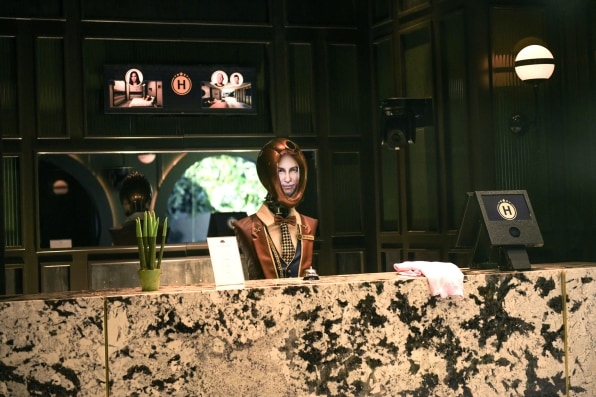
“You can do anything with the press of a button, but that doesn’t necessarily make things easier,” says Ronen. “It only makes your choices much harder . . . Your life in the game counts on what you buy.”
(Those with an Amazon Prime addiction can surely sympathize.)
Keshet does, however, utilize one piece of proprietary technology that lives up to its futuristic ideals. The company tapped Israeli startup SmartTag to create a city operating system linked to the residents’ wristbands. It not only records every single purchase–from washing machine use to buying a sandwich–but all movement and action. The idea is to sell that technology beyond reality-TV entertainment, although the company does not foretell exactly how yet.
But the real money here is the sponsorship opportunity. Keshet did not divulge specific numbers, but confirmed that it sold nearly all sponsorships prior to the show’s launch. That includes which coffee is brewed in the cafe, which brands are displayed in the clothing boutique window, and what hotel group designed the actual hotel.
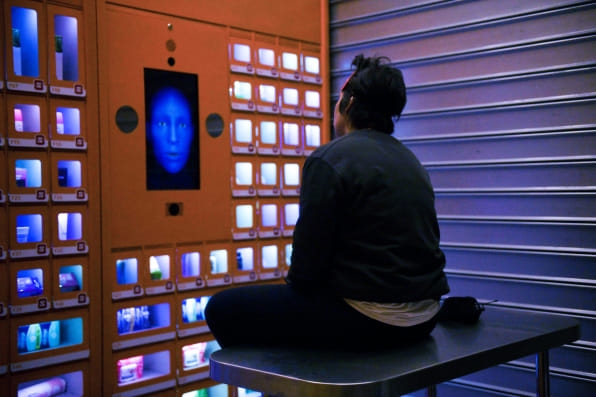
That certainly plays well to retail and digital extension. IKEA signed on to decorate the entire house, and a month later, offered exact replicas of each room in their Israel store. Every week, its display windows match those in the show.
As one production staff member told me, the 2025 house is painted yellow and blue for a reason.
This is far more than product placement, it’s extreme product integration. “Contestants fight every week who will get into the Ikea house,” says Basel. “That’s priceless for brands.”
Kelly Wright, SVP of distribution at Keshet, explains that this offers a new platform for potential franchise clients. “It’s not just sponsorship, it’s ownership,” she says. Keshet is inevitably selling a piece of landscape, something competitors don’t offer: You cannot, for example, buy a piece of whatever island Survivor rents. “Here you have a unique opportunity where for three or four months of the year, an Apple or Ikea or Renault can be the exclusive thing that people watch eight hours a week on prime-time TV and [streamed] 24/7 online.”
A new entertainment model
In its first month, 2025 outperformed established Israeli shows such as Celebrity Big Brother, Kitchen Nightmares, and Israel’s Got Talent. Keshet is already in talks with several international networks who either want to rent the 2025 city, or license plans to build a similar one in their own country. Currently, they’re eyeing new locations in Lithuania, Bulgaria, and Hungary, and targeting mainstream U.S. networks as well.
Revital notes that 2025 is best suited for international adoption since the show is ultimately very cultural. “It’s meant to expose societal behavior and a nation’s mentality.” That’s certainly apparent with the Israeli version, where issues such as masculinity, authenticity, and communal sacrifice come into play.
In one recent episode, an older male contestant angrily confronts a young new resident who didn’t give him anything when she came into a sizable amount of prize money.

“It’s pathetic that the eldest didn’t get a single [cent],” he argues. This attitude speaks to Israelis’ tradition of showing utmost respect for their elders.
Keshet considers the Israeli version, presently in mid-season, its “pilot.” The beta version serves as a testing ground of the producers’ hypothesis, and already they’re instituting rule changes and set tweaks, such as giving more power to the viewer.
Nir stresses that 2025 is marketed in the “near future,” and not the more vague “future.” These are the issues he thinks most pressing in the next six years. And then after that?
“We’ll update the show with new future elements that are socially relevant,” he says. “Maybe the next season will be called 2026 or 2027.”
Fast Company , Read Full Story
(61)